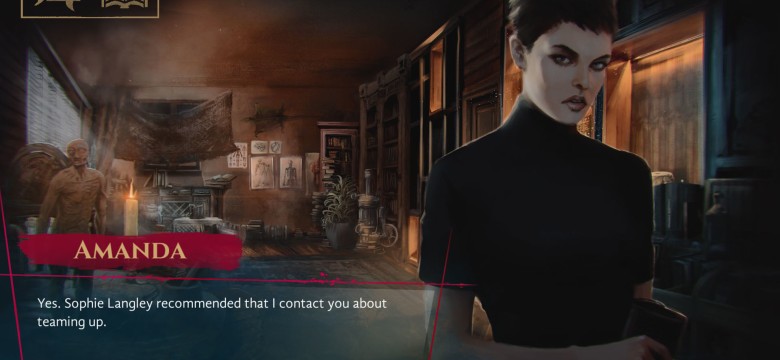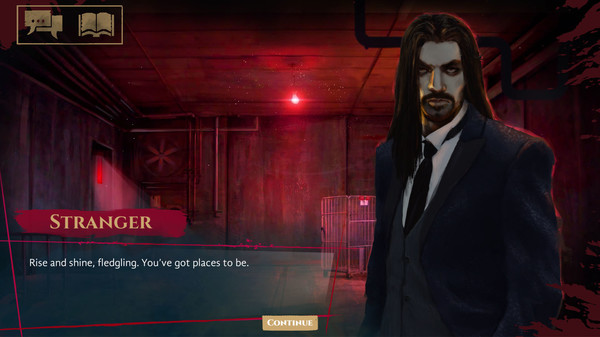I recently got a very good promotion on Steam for Vampire: The Masquerade ― Coteries of New York. This game was developed and published by Draw Distance back in 2019 and piqued my interest since I have enjoyed Vampire: The Masquerade ― Swan Song. They’re different genres; Coteries of New York is a visual novel through and through, while Swan Song is a narrative-driven, single-player RPG. Both have different developers and writers, so I thought it’d be very interesting to see how different people interpret the same world.
Vampire: The Masquerade is originally a tabletop role-playing game published in 1991. It is part of the larger World of Darkness series. It has several adaptations, from LARPs to all sorts of video games at the moment.
Source: Steam
Coteries of New York brings a struggle between two vampire factions to the table: the Anarchs and the Camarilla, told from the point of view of the player. The player can choose between three different characters: two male and one female, each with distinct characteristics and belonging to different vampire clans. All the stories begin with the chosen character being made a vampire by a mysterious someone and continue from the following day, when the character is changed and doesn’t understand what happened and what is going to happen from that night on.
In each case, the presented story background differs, which is always a great point. The mysterious vampire is never the same. Concept-wise, the narrative feels interesting and eerie: how should one react, waking up one day, after meeting the odd someone, to find oneself in a strange place with bodies around you, with a foggy memory? It is creepy. It can take you to so many thought-provoking narratives, it can explore so many emotions and put you down a scary rabbit hole of what is living, what is the curse of the undead, of never seeing the sun again, of never having true friends because it’s a world of politics, of never eating again, of never feeling full, because the thirst (or the hunger, as the game calls it) never abandons you.
In that sense, in the sense of concept, the world feels extraordinarily material. I do think it is because the world was already there either way. The player here is just a speck of dust in the big world, which is amazing in terms of storytelling. Unfortunately, although many of the concepts introduced in Coteries of New York are very compelling, the narrative and the writing are not.
Now, I understand that visual novels must be very easy to read and straightforward. Otherwise, you’d probably look for a different medium, like a book or a comic. It leaves the question of how easy is too easy. Go overboard and you’ll sound childish and, in this case, you’ll lose two very important things for this story: the disturbing, that is, the horror part, and the other one, the credibility.
Credibility does not mean that you must write about real characters. That’s not what a game is about, in my opinion. But you do want a character that feels real. That you’d assume would act a certain way because in the real world that’s more or less what happens. Coteries of New York makes a mistake here because it brings characters that are oversimplistic. The way they speak and act, for instance, might make sense when you’re fourteen to sixteen, but not make any sense when you’re twenty-five or thirty.
Let’s take the businesswoman character for example. She is a grown woman who climbed the corporate ladder. This is very impressive. For once, you’ll assume she is someone very political and very good at it, good at managing emotions and the type that does not panic under stressful situations. You’ll also expect a certain type of discourse that is mature. That expectation does not translate in the story. This might be because the options are very similar no matter the character you play (although they diverge a tiny bit). The exaggerated use of pop culture references also takes you out of the character very often (expressions like “Netflix and chill,” “this gal,” “this punk ain’t got nothing on me”) and also does the disfavor of breaking the horror of any situation.
The constant use of cultural references, a discourse that is too infantile for the world, characters that feel superficial, and the lack of a strong narrative in writing breaks the immersion that the art (which I found very cool), the sound and music, and even the concept alone are trying their best to materialize. It becomes noise. And it is a pity because, as I’ve said before, the idea is compelling and they touch ― unfortunately only at surface level ― on curious topics that should a hundred percent be taken to their full potential.
Now, mechanic-wise, the game is quite simple. It missed an auto button and that bothered me to a great level (I wanted to have lunch while watching!). I played it on PC and the keys wouldn’t allow me to go down the text, so I had to use the cursor every time. Perhaps it is a bit more optimized for PS4? Not sure.
Overall, this one is more a miss than a hit. Regardless of who you choose, you’ll end up with the same end story, the plot is not fully developed (sometimes it doesn’t even make sense), and the writing is childish. For fans of the saga, it is still a compelling exploration of the world, so if you don’t mind any of that and you’re just a curious one like me, sure, why not? Otherwise, if you’re looking for a nice visual novel, perhaps you’d like to pass on this one.




